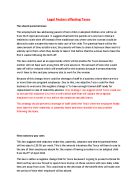Although the reasons for economic stagnation vary, sever factors stand out, none of which have anything to do with free trade or globalization.[3] Many of the worlds poorest countries have suffered from totalitarian governments, economic policies that destroyed wealth rather than facilitated its creation, endemic corruption, scant protection for property rights, and war, Such factors help explain why countries such as Afghanistan, Cambodia, Cuba, Haiti, Iraq, Libya, Nigeria, Sudan, Vietnam, and Zaire have failed to improve the economic lot of their citizens during recent decades. A complicating factor is the rapidly expanding populations in many of these countries. Without a major change in government, population growth may exacerbate their problems. Promoters of free trader argue that the best way for these countries to improve their lot is to lower their barriers to free trade and investment and to implement economic policies based on free market economics. [4]
Many of the world’s poorer nations are being held back by large debt burden. Of particular concern are the 40 or so “highly indebted poorer countries” (HIPCs), which are home to some 700 million people. Among these countries the average government debt burden is equivalent to 85% of the value of the economy, as measured by gross domestic product, and the annual cost of serving government debt consumes 15 percent of the country’s export earnings.[5] Servicing such a heavy debt load leaves the governments of these countries with little left to invest in important public infrastructure projects, such as education, health care, roads, and power. The result is the HIPCs are trapped in a cycle of poverty and debt that inhabits economic development. Free trade alone, some argue, is a necessary but not sufficient prerequisite to help these countries bootstrap themselves out of poverty. Instead, large scare debt relief is needed for the world poorest nations to give them the opportunity to restructure their economies and start the long climb toward prosperity. Supporters of debt relief also argue that new democratic government in poor nations should not be forced to honor debt that their corrupt and dictatorial predecessors incurred and mismanaged long ago.
In the late 1990s, a debt relief movement began to gain ground amount the political establishment in the world’s richer nations. [6] Fueled by high-profit endorsements from Irish-rock start Bono (who has been a tireless and increasingly effective advocate for debt relief), Pope John Paul 2, the Dalai Lama, and influential Harvard economist Jeffery Sachs, the debt relief movement was instrumental in persuading the US to enact legislation in 2000 that provided $450 million in deft relief for HIPCs. More important perhaps, the United States also backed an IMF plan to sell some of its gold reserves and use the proceeds to help with debt relief. The IMF and World Bank have now picked up banner and have embarked on a systematic debt relief program.
For such a program to have a lasting effect, however, debt relief must matched by wise investment in public projects that boost economic growth (such as education) and by the adoption of economic policies that facilitate investment and trade. The rich nations of the world of the world also can help by reducing barriers to the importation of products and textiles. High tariff barriers and other impediments to trade make it difficult for poor countries to export more of their agricultural production. The World Trade Organisation has estimated that if the developed nation of the world eradicated subsides to their agricultural producers and removed tariff barriers to trade in agriculture this would raise global economic welfare by $128 billion, with $30 billion of that going to developing nations, many of which are highly indebted. The faster growth associated with expanded trade in agriculture could reduce the number of people living in poverty by as much as 13% by 2015, according to WTO. [7].
References: -
- L. Pritchett, “Divergence, Big Time, “journal of Economic perspectives 11, no. 3 (summer 1997), pp, 3-18.
- Ibid.
- W.Easterly, How Did Heavily Indebted Poor Countries Become Heavily Indebted?” World Development, October 2002, pp.1677-96; and J.Sachs, the End of Poverty (New York, Penguin Books, 2006).
- See D. Ben-David, H. Nordstrom, and L. A. Winters, “Trader, Income Disparity and Poverty,” World Trade Organization special studies No.5 (Geneva: WTO, 1999).
- W. Easterly, “Debt Relief,” Foreign Policy, November-December 2001, pp.20-26.
- J. Sachs, “Sachs on Development Helping the World Poorest,” The Economist, August 14, 1999, pp. 17-20.
- World Trade Organisation, Annual Report 2003 (Geneva: WTO, 2004).







